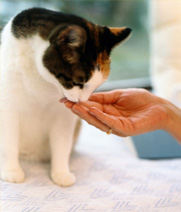From the Editors of The Daily Cat
As a cat ages, changes occur in the way its body functions, so it makes sense that what it eats might also need to change. The following list of health issues may be more common in aging pets.
- Decreased immune system function
- More frequent intestinal problems
- Decreased mobility
- Dental issues
For mature cats with health issues, you can help by providing special nutrition for their special needs. Here’s how.
Decreased Immune System Function
Throughout a cat’s life, a process called peroxidation occurs. Peroxidation is a normal process that the body uses to destroy cells that outlive their usefulness and kill germs, parasites, etc. but also can destroy or damage healthy cells. As a cat ages, the damage caused by peroxidation accumulates which, in turn, increases the risk of certain problems, such as infections.
Antioxidants are naturally occurring nutrients that help maintain overall health by neutralizing the peroxidation process of cellular molecules. Some antioxidants, such as vitamin E, beta-carotene, and lutein, are naturally occurring nutrients.
Recent research has found that dogs and cats fed a diet rich in antioxidants such as vitamin E, lutein, or beta-carotene had improved immune responses and vaccine recognition. This may be especially important for aging cats, because studies have found that as cats age, immune responses can decrease.
More Frequent Intestinal Problems
Older cats may have higher numbers of unfavorable bacteria and lower numbers of beneficial bacteria in their intestines, which can result in clinical signs of gastrointestinal problems (e.g., diarrhea).
Feeding a diet containing fructooligosaccharides (FOS) — a unique fiber source that helps nutritionally maintain healthy intestinal bacterial populations — promotes growth of beneficial bacteria. Beet pulp, a moderately fermentable fiber source, also helps maintain intestinal health by providing energy for the cells lining the intestine and promoting small, firm stools.



So how can I get the FOS into my cat’s diet?
Thanks fro stopping by, Stella. I am not a vet and neither is the author of the article, so I can only suggest things from personal experience. FOS is a powder, so sprinkling something like Fiber Smart could be one option.
Sorry, I’m not buying this. FOS occurs naturally in foods cats would never eat, so I’m thinking this is just some kind of marketing crap.
http://www.scdiet.org/6research/fos.html
When my cat started having health problems, it was right around the time of the big cases of poisoned cat food (including Iams, thanks). The more I researched feline nutrition trying to find a new food for my cat, the more information I found that cats should be on a mostly meat diet, the closer to natural the better.
And it occured to me that my grandmother’s cats always lived until their late teens and she mostly feed them meat & fish & occasionally supplemented with commercial cat food.
Long story longer, if they make it in a science lab, it doesn’t belong on your cat’s plate (or yours for that matter!)
Do the research before you start feeding your cat this stuff.
PS. My cat is a very healthy 19 almost 20 year old!
You make very valid points. Although I did not write this article, I want to note that when it is necessary to give a cat supplements (nutritional, medical, etc.) I found it easier to administer the supplements by mixing them with commercial cat food. That is not an endorsement but my observation.